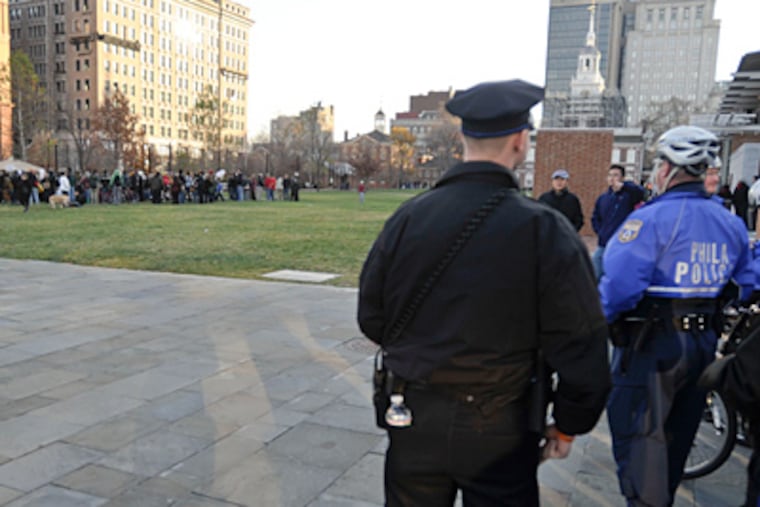Tactics to disperse Occupy shaped by police experience, lawsuits
In 2002, police in the nation's capital rounded up hundreds of people protesting the World Bank and International Monetary Fund.

In 2002, police in the nation's capital rounded up hundreds of people protesting the World Bank and International Monetary Fund.
The arrests involved taking large groups into custody with no warning. Along with similar mass detentions in 2000, those tactics ended up costing the city $22 million for civil rights violations.
Charles H. Ramsey, Washington's police chief at the time, was forced to apologize for those arrests to each and every plaintiff, and the District of Columbia passed laws forbidding the crowd-control techniques he used.
Since then, Ramsey said, he and other law enforcement officials have sought better ways to maintain public safety when crowds assemble.
"I spent almost nine years as chief in Washington," Ramsey, now Philadelphia police commissioner, said Friday. "Some protests we handled better than others, but you gain a lot of experience in deciding how to handle that."
Early Wednesday, the Philadelphia police evicted the Occupy Philly camp on Dilworth Plaza, resulting in 52 arrests.
Most of those arrests came hours after the original action, when officers corralled 45 protesters on 15th Street south of Spring Garden.
This time, Ramsey said, he learned from experience, and is confident the arrests, most for failure to disperse, will stand. But already protesters and lawyers are arguing that the detentions were illegal.
"We are certainly seeing Ramsey executing the same type of trap-and-detain arrests. The trap-and-detain tactic is one that is unconstitutional and it's illegal," said Mara Verheyden-Hilliard, who was lead counsel in the class actions against Ramsey. She is executive director of the Partnership for Civil Justice Fund, which provides support to Occupy demonstrators nationally.
Both the First and Fourth Amendments protect protesters, she said. The First gives them the right to speak freely and assemble peaceably. The Fourth protects against unreasonable search and seizure and requires probable cause for an arrest.
Legal arrest requires police to give fair notice of an order and an opportunity to comply, she said.
Occupy Philly demonstrators say police offered no warnings just before the detentions at 15th and Hamilton Streets about 5 a.m.
"We were told to move off of the street and onto the sidewalk. We complied, and they arrested us. We got on the sidewalk and they arrested us anyway," said Occupier Dustin Slaughter, 32, of Fishtown.
Ramsey, however, said he was confident police videotape would show that police notified the protesters.
"We had one crowd that voluntarily got up on the sidewalk and another section that did not get out of the street right away," he said, noting that many Occupiers at the scene were not arrested.
Ramsey said he had hoped to avoid detaining anyone.
Larry Krasner, a Philadelphia lawyer representing some demonstrators here, said he expected juries to favor the Occupiers. Under state law, a defendant's good character alone can create reasonable doubt, he said.
"Philadelphia juries and judges who have to decide the fate of these good people are going to acquit them," he said. Most demonstrators arrested during the Republican National Convention here in 2000 were acquitted, he said.
Occupiers complained that police shoved them with bicycles, hit them with batons, and, in one case, intentionally rode a horse into a crowd, injuring a protester's foot.
Ramsey said all such complaints would be investigated. He banned the use of pepper spray, saying the infamous video of an officer at the University of California-Davis had influenced him.
After police told Occupiers they had to leave Dilworth about 1 a.m. Wednesday, many of them locked arms and began marching through Center City. Police followed on bicycles, horses, and on foot - for four hours.
Often, Occupiers stopped to chant and yell at police. Sometimes, the protesters were lighthearted, but some cursed the officers, often just inches from their faces. Skirmishes erupted frequently, and the darkness clouded who did what. When police surrounded a protester on the ground, other Occupiers rushed to see if the person was OK, often encircling the police, who then picked up their bicycles and pushed the crowd back.
At any point, unnecessarily aggressive behavior, whether from a police officer or a protester, can tip a crowd from peaceful to outraged. Since the Vietnam War demonstrations, many police departments have tried to reduce the potential for violence.
"Out of the '60s and early '70s, law enforcement woke up and said, 'You know what, we don't like having heaps of urine-filled bags and whatnot thrown at us,' " said David Klinger, a professor at the University of Missouri-St. Louis and an expert on police decision-making. "Cops got smart over the years and said let's figure out ways to avoid it, and let's negotiate."
For some mass rallies, police and protesters choreograph the entire event, agreeing ahead of time how long it will last and even who will get arrested, he said.
Richard Odenthal, a retired Los Angeles County Sheriff's Department captain who has taught riot-control classes, advises officers who believe they need to clear an area to offer protesters as many chances to leave as possible.
Philadelphia police were worried that Occupiers might try to create a new encampment elsewhere, possibly fueling their decision to surround the group on 15th Street.
Verheyden-Hilliard, however, said that police can't arrest people preventively.
Odenthal said a better strategy may have been to allow people on 15th Street to leave the area in small groups and monitor them to avoid a disruption elsewhere.
Even so, Odenthal said, he believed Ramsey had done a good job: "My impression of him is that he's innovative and concerned about the entire community."
Verheyden-Hilliard said police across the United States use mass arrests to scare protesters.
"It has a huge chilling effect on people," she said. "It also puts people through the system, and it punishes them. You have to get an attorney, and you have an arrest record."